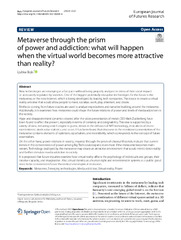Приказ основних података о документу
Metaverse through the prism of power and addiction: what will happen when the virtual world becomes more attractive than reality?
| dc.creator | Bojić, Ljubiša | |
| dc.date.accessioned | 2022-12-23T09:46:43Z | |
| dc.date.available | 2022-12-23T09:46:43Z | |
| dc.date.issued | 2022 | |
| dc.identifier.uri | http://rifdt.instifdt.bg.ac.rs/123456789/2714 | |
| dc.description.abstract | New technologies are emerging at a fast pace without being properly analyzed in terms of their social impact or adequately regulated by societies. One of the biggest potentially disruptive technologies for the future is the metaverse, or the new Internet, which is being developed by leading tech companies. The idea is to create a virtual reality universe that would allow people to meet, socialize, work, play, entertain, and create. Methods coming from future studies are used to analyze expectations and narrative building around the metaverse. Additionally, it is examined how metaverse could shape the future relations of power and levels of media addiction in the society. Hype and disappointment dynamics created after the video presentation of meta’s CEO Mark Zuckerberg have been found to affect the present, especially in terms of certainty and designability. This idea is supported by a variety of data, including search engine n-grams, trends in the diffusion of NFT technology, indications of investment interest, stock value statistics, and so on. It has been found that discourse in the mentioned presentation of the metaverse contains elements of optimism, epochalism, and inventibility, which corresponds to the concept of future essentialism. On the other hand, power relations in society, inquired through the prism of classical theorists, indicate that current trends in the concentration of power among Big Tech could expand even more if the metaverse becomes mainstream. Technology deployed by the metaverse may create an attractive environment that would mimic direct reality and further stimulate media addiction in society. It is proposed that future inquiries examine how virtual reality affects the psychology of individuals and groups, their creative capacity, and imagination. Also, virtual identity as a human right and recommender systems as a public good need to be considered in future theoretical and empirical endeavors. | sr |
| dc.language.iso | en | sr |
| dc.publisher | Springer Open | sr |
| dc.relation | info:eu-repo/grantAgreement/MESTD/inst-2020/200025/RS// | sr |
| dc.rights | openAccess | sr |
| dc.rights.uri | https://creativecommons.org/licenses/by/4.0/ | |
| dc.source | European Journal of Futures Research | sr |
| dc.subject | Metaverse | sr |
| dc.subject | Emerging technologies | sr |
| dc.subject | Media addiction | sr |
| dc.subject | Virtual reality | sr |
| dc.subject | Power | sr |
| dc.title | Metaverse through the prism of power and addiction: what will happen when the virtual world becomes more attractive than reality? | sr |
| dc.type | article | sr |
| dc.rights.license | BY | sr |
| dc.citation.issue | 22 | |
| dc.citation.volume | 10 | |
| dc.identifier.doi | 10.1186/s40309-022-00208-4 | |
| dc.type.version | publishedVersion | sr |
| dc.identifier.fulltext | http://rifdt.instifdt.bg.ac.rs/bitstream/id/9477/bitstream_9477.pdf |

